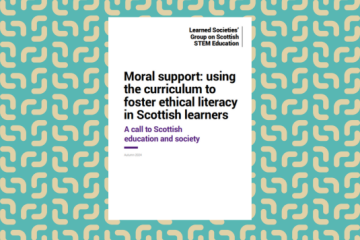Ethical literacy teaching – new report from the Learned Societies Group on Scottish STEM Education

On 1 September, The Royal Society of Edinburgh published a report on behalf of the Learned Societies Group on Scottish STEM Education (LSG): Moral support: using the curriculum to foster ethical literacy in Scottish learners: A call to Scottish education and society
Susie Burr, Chair of ASE Scotland, member of LSG representing ASE wrote the following article for Education in Science earlier this year, which gives the background to the report:
In 2023, the Learned Societies group (LSG) of which ASE is a member held a workshop and round-table sessions to investigate the ethics of knowledge in the curriculum. Initial aims were to explore whether the teaching of ethical literacy should be a greater priority for Scottish schools, and to look at the practical steps to take to improve its teaching. The sessions were:
Why do science and data ethics increasingly matter in the 21st century? – Dr. Eve Poole OBE, Interim CEO of the Carnegie Trust for the Universities of Scotland.
Eve spoke about how society perceives ethics and what this means for ethical education. She pointed out that: young people are born with an innate grasp of ethics (a ‘moral compass’); these beliefs can be swayed by charismatic or persuasive figures and forces; there is a need to nurture young people to evolve their personal ethical framework; there is a place for virtue ethics, which is founded on individual character rather than specific outcomes; and young people can cultivate an ethical framework to enable them to make sense of a changeable and sometimes misleading world.
How do young people view ethics and how are they currently taught and covered in the curriculum? – Jennie Hargreaves, Principal Teacher of Physics at Lockerbie Academy.
Jennie’s session explored how ethics are taught in the Curriculum for Excellence (CfE) and how young people perceive ethics. She suggested that there are limits to how far this morality can develop in the absence of external guidance and we have a moral imperative to teach young people ethical thinking, as societal problems can be attributed to the actions of previous generations. She advocated for making ethics an essential part of the curriculum, with lessons beginning early, as, by the time learners are exposed to this content, they are often already deeply entrenched in the world of social media and technology.
How do we encourage young people to become critical consumers of knowledge and research? – Dr. Sinéad Rhodes, a developmental psychologist interested in the cognitive factors underlying behaviour and learning.
Sinéad’s research has principally focused on cognition, especially memory and associated executive functions, in children with neurodevelopmental disorders. There followed detailed discussion in groups, with questions including: exploring the relationship between science and society and what influences this; what are the consequences of a society that lacks the capacity to decide what is and is not ethical; how can pupils best learn about science and ethics in school; what practical steps can we take to fulfil our responsibilities as a scientific community; how can we prepare young people for the future; and what are young people concerned about.
The key findings of our discussions are:
The Why:
- The whole of society benefits from ethical literacy; it is universally applicable.
- Empowering young people makes sure that everyone is well-informed and can counter misinformation.
The What:
- Shared values provide scaffolding for personal views.
- Discussions allow young people to talk about difficult issues; science is an effective tool for this.
The How:
- Ethical literacy must be nurtured, with links to home and community, and needs to begin early.
- Fitting it into curriculum can be difficult, especially in senior secondary.
- It is an important part of interdisciplinary learning.
- Young people need to actively engage, but teachers will need the tools.
- Current educational reforms may offer opportunities to develop these skills.
The full report can be found on the Royal Society of Edinburgh website at:
